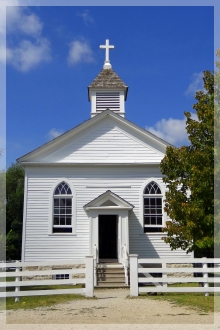Don’t copy the behavior and customs of this world, but let God transform you into a new person by changing the way you think. Then you will learn to know God’s will for you, which is good and pleasing and perfect. [Romans 12:2 (NLT)]
The man who does not know where he is is lost; the man who does not know why he was born is worse lost; the man who cannot find an object worthy of his true devotion is lost utterly. [A.W. Tozer]
 A firm with whom we do business sends us a newsletter every month. After asking their associates what accomplishment in the last year made them most proud, January’s newsletter shared some of the answers. One man was proud that, after reading up on motors, he managed to repair the family boat by changing the starter motor, another was proud that he expanded his horizons by hiking and rock climbing in various national parks during the year, and a third man was proud that a case he pled had been cited in several law review articles.
A firm with whom we do business sends us a newsletter every month. After asking their associates what accomplishment in the last year made them most proud, January’s newsletter shared some of the answers. One man was proud that, after reading up on motors, he managed to repair the family boat by changing the starter motor, another was proud that he expanded his horizons by hiking and rock climbing in various national parks during the year, and a third man was proud that a case he pled had been cited in several law review articles.
The response that touched me, however, was from a man who had just been inducted into the Accounting Hall of Fame and named as one of the ten most influential people in his industry. While pleased by those honors, they were not his point of pride. This man was most proud of the fact that he’d made a positive impact on other people’s lives through his work—that people came to him with issues to clarify, problems to solve, or obstacles to surmount and he helped them. He shared that bettering the lives of others is the force that drives him to do what he does. After reading his response, I wondered how I would answer that same question. How would you? Of what are you most proud?
That question brought to mind A.W. Tozer’s words about a wealthy English aristocrat whose obituary read that he had “devoted his life to trying to breed the perfect spotted mouse.” While Tozer didn’t argue with the man’s right to breed spotted mice, he was troubled that a man of means and position would have devoted his entire life to such a task. Of this nameless man, Tozer wrote, “Made in the image of God, equipped with awesome powers of mind and soul, called to dream immortal dreams and to think the long thoughts of eternity, he chooses the breeding of a spotted mouse as his reason for existing.…Surely this is a tragedy.”
Apparently, breeding rodents is not as far-fetched as it sounds. There’s a National Mouse Club in England, the Rat & Mouse Club of America, and a Rat & Mouse Gazette. Every November 12 is Fancy Rat & Mouse Day and every April 4th is World Rat Day. While some people keep mice and rats as pets, I hope they aren’t devoting their lives to their rodent companions. Although mice are often bred and genetically modified to study genetics and human diseases, I hope that even the most zealous geneticists and researchers are not devoting their entire lives to that project.
We’re probably not trying to breed the perfect spotted mouse, but are we devoting our lives to its equivalent? People dedicate their lives to making money, becoming famous, getting frequent flyer miles, climbing mountains, having fun, setting or breaking records, shopping, going to casinos or playing the ponies, having a pristine house, decorating and redecorating, or building collections of art, cars, and Star Wars figures. While nothing is inherently wrong with those activities, none are worthy of our devotion! As Christians, Tozer points out that we have no right to dedicate ourselves to anything that can “burn or rust or rot or die.” We are not to give ourselves “completely to anyone but Christ nor to anything but prayer!”
Rather than having our obituaries tell of our commitment to breeding spotted mice, collecting Labubus, or attending every Grateful Dead concert, wouldn’t we rather have them speak of our devotion to God and of our love for His children? Rather than being remembered for the perfect spotted mouse or an immaculate house, I’d rather be remembered for making a positive impact on the lives of others.
One of the glories of the Christian gospel is its ability not only to deliver a man from sin but to orient him. … The spirit-illuminated Christian cannot be cheated. He knows the values of things; he will not bid on a rainbow nor make a down payment on a mirage; he will not, in short, devote his life to spotted mice. [A.W. Tozer]

 Before stepping inside of the Bern Münster Cathedral, you’ll probably stop and stare at the archway above the main entrance. There you’ll see 294 carved sandstone figures in a graphic illustration of God’s final judgment when the wicked are separated from the righteous. To your right are the naked damned souls in the midst of flames while, on your left, the righteous stand clothed in white and marked with the seal of God on their foreheads. Lady Justice with her scales and the Archangel Michael with his sword stand in the center. The entire scene is surrounded by larger statues of various saints and martyrs as well as the five wise virgins and the five foolish ones who weren’t ready for the bridegroom’s return!
Before stepping inside of the Bern Münster Cathedral, you’ll probably stop and stare at the archway above the main entrance. There you’ll see 294 carved sandstone figures in a graphic illustration of God’s final judgment when the wicked are separated from the righteous. To your right are the naked damned souls in the midst of flames while, on your left, the righteous stand clothed in white and marked with the seal of God on their foreheads. Lady Justice with her scales and the Archangel Michael with his sword stand in the center. The entire scene is surrounded by larger statues of various saints and martyrs as well as the five wise virgins and the five foolish ones who weren’t ready for the bridegroom’s return! Remember the Sabbath day, to keep it holy. Six days you shall labor, and do all your work, but the seventh day is a Sabbath to the Lord your God. On it you shall not do any work, you, or your son, or your daughter, your male servant, or your female servant, or your livestock, or the sojourner who is within your gates. [Exodus 20:8-10 (ESV)]
Remember the Sabbath day, to keep it holy. Six days you shall labor, and do all your work, but the seventh day is a Sabbath to the Lord your God. On it you shall not do any work, you, or your son, or your daughter, your male servant, or your female servant, or your livestock, or the sojourner who is within your gates. [Exodus 20:8-10 (ESV)]
 With just one week until Christmas, we may find ourselves sorely tempted to repeat Scrooge’s “Bah, humbug!” We’ve been busy with planning, cooking, baking, cleaning, decorating, shopping, wrapping, packing, and shipping; chances are that our expectations have become unrealistic and impossible to achieve. It’s easy to get so wrapped up in doing and getting that we forget the purpose of this wonderful holiday.
With just one week until Christmas, we may find ourselves sorely tempted to repeat Scrooge’s “Bah, humbug!” We’ve been busy with planning, cooking, baking, cleaning, decorating, shopping, wrapping, packing, and shipping; chances are that our expectations have become unrealistic and impossible to achieve. It’s easy to get so wrapped up in doing and getting that we forget the purpose of this wonderful holiday. When a friend won a trivia contest because she knew the day and year Elvis Presley died, I asked how she recalled the exact date. She replied, “I remember because August 16, 1977, was the day I traded one king for another one—it’s the day I accepted Jesus!” Indeed, it is an important date for her to remember. I don’t know when my mother-in-law became a Christ follower but my father-in-law marked his acceptance of Jesus with his baptism at the age of 17 (in 1925). I only know this because my in-laws kept a certificate attesting to his baptism in their safe deposit box along their birth certificates, passports, voter registrations, social security cards, and marriage certificate.
When a friend won a trivia contest because she knew the day and year Elvis Presley died, I asked how she recalled the exact date. She replied, “I remember because August 16, 1977, was the day I traded one king for another one—it’s the day I accepted Jesus!” Indeed, it is an important date for her to remember. I don’t know when my mother-in-law became a Christ follower but my father-in-law marked his acceptance of Jesus with his baptism at the age of 17 (in 1925). I only know this because my in-laws kept a certificate attesting to his baptism in their safe deposit box along their birth certificates, passports, voter registrations, social security cards, and marriage certificate.